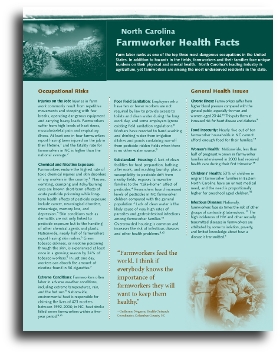
By Lori Johnson | Originally posted at NC Policy Watch
If there is a dominant myth in the debate over America’s treatment of the men and women who harvest our food, it is that U.S. workers won’t take these jobs. A recent study by a researcher named Michael Clemens at the Center for Global Development (CGD), a Washington, DC think tank, and released by the Rupert Murdoch backed Partnership for a New American Economy, makes just such a claim.
The study, which was picked up by media outlets around the country, concludes erroneously that unemployed U.S. workers aren't taking farmworker jobs and therefore don't require much in the way of legal protections.
Unfortunately, the study’s conclusions are demonstrably false and based on faulty information.
Set in North Carolina, the study outright ignores the existence of virtually all the U.S. workers doing farm work in North Carolina. For 2010, the study accounts for only 74 workers, less than one percent of the U.S. workers referred to farm jobs through the North Carolina Division of Employment Security (DES) alone.
The study is limited to farms that bring in foreign labor through the federal H-2A visa program and then only to jobs with the North Carolina Growers' Association (NCGA), a labor broker that charges farms to bring in foreign H-2A labor. Yet NCGA's U.S. worker recruitment outcomes are hardly representative. With four-fifths of the H-2A jobs in North Carolina last year, it received only one-fifth of job service U.S. worker H-2A referrals.
The study falsely presumes that the lack of U.S. workers on H-2A farms is due to worker choice. It even claims that there is "extensive coordination" between NCGA and the state Job Service agency, which is supposed to help connect unemployed workers to jobs.
The reality is some Job Service officials are loathe to refer U.S. farmworkers to H-2A positions, which require much more paperwork. Recently, when an American brought three H-2A job orders to a local Job Service agent, the agent threw the orders in the trash. When another U.S. citizen sought tobacco work, the Job Services official told her "I don't do H-2A, it's too complicated." Other examples of this kind of treatment abound.
Indeed, the CGD study is based on a time period when Job Service offices were operating under a 2007 U.S. Department of Labor directive to avoid referring US workers to H-2A jobs. The study assumes that a lack of increased referrals during the recession means U.S. workers are not responsive to market forces, ignoring the counteracting force of this federal directive in place during the same time period.
Most U.S. workers don't even know these jobs exist. Several Job Service offices don't post NCGA jobs in the county of actual employment. Instead, the "master job orders,” with information on jobs throughout the state, are posted in the county where NCGA’s headquarters is located. This means that a man who conducts a Job Service database search for work in his home county doesn't even see the available NCGA positions.
There are reasons to doubt the study's claim that few Americans finished the season. The federal Office of the Inspector General (OIG) audited the NCGA and found the NCGA had used a false end date that included late season sweet potato work not available to most workers. The OIG determined it was impossible for most workers, foreign or domestic, to "finish the season."
The study presumes higher turnover is the worker's fault. With many tactics in the playbook of how to get rid of the U.S. workers, perhaps turnover was the goal. Legal Aid of North Carolina has represented U.S. workers at different employers who claimed that the H-2A workforce was given preferential treatment.
Why not welcome U.S. workers? Well, for starters, a foreign labor broker's entire business model depends on Americans not being available. Each U.S. worker hired means reduced profit.
In addition, foreign H-2A workers are exempt from certain core federal worker protection laws and cannot lawfully work anywhere but the farm to which they are assigned.
Perhaps most importantly, though, is the fact that foreign workers are less likely to complain if not paid or treated properly because they fear losing their visa. Add to this the fact that the H-2A program also allows growers to custom pick a workforce that is male and young and unburdened by local family responsibilities and it’s no wonder U.S. workers face such discrimination.
As noted, the study recommends further reducing protections for U.S. workers.
Ignoring all the counteracting factors, the study concludes that U.S. workers won't respond to increased wages or improved working conditions. And of course this “logic” flies in the face of basic market rules that tie supply to better wages and working conditions.
The truth is there are many workers – both U.S. citizens and authorized aliens – that need and want agricultural jobs. And should immigration reform proposals currently before Congress pass, there will be many more legal workers.
The existence of foreign labor and the need to protect U.S. workers are not mutually exclusive. Let’s hope the public isn't fooled by this ill-conceived and badly-flawed effort to cloak discrimination against American workers.
 Wednesday, October 23, 2013 at 2:08PM by
Wednesday, October 23, 2013 at 2:08PM by  Amanda Soltes
Amanda Soltes 













